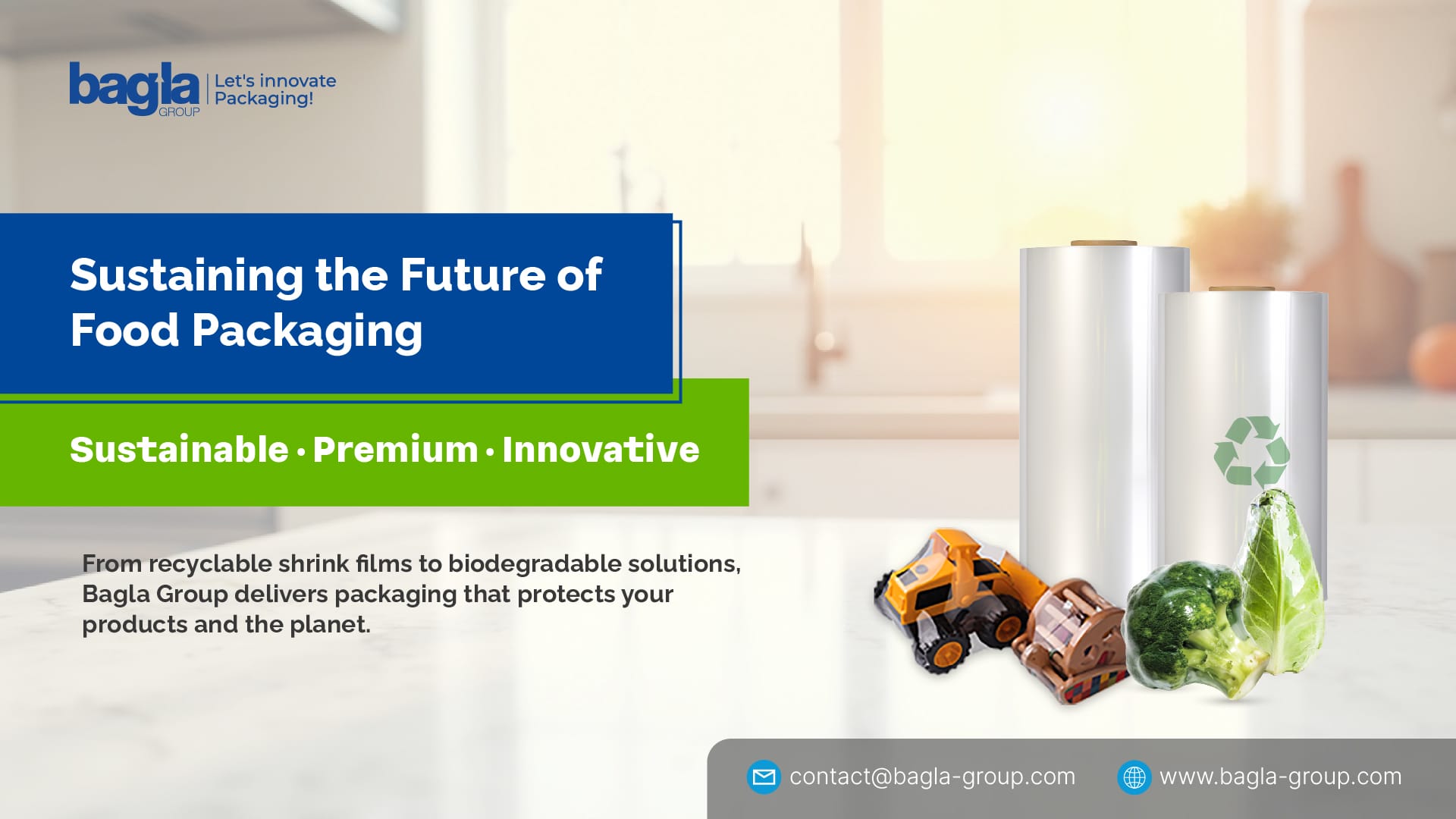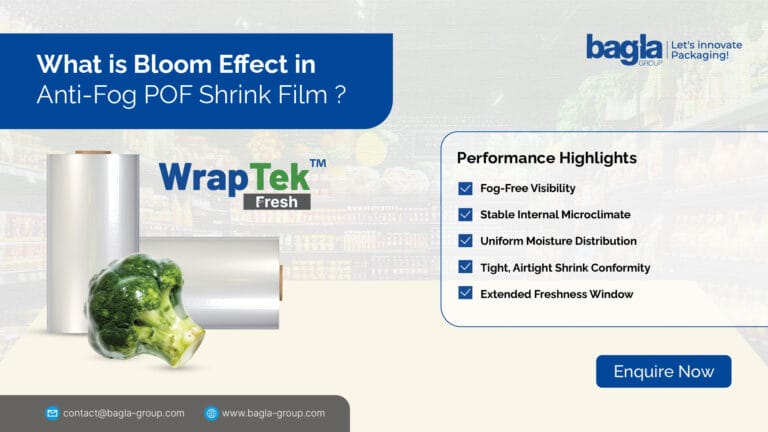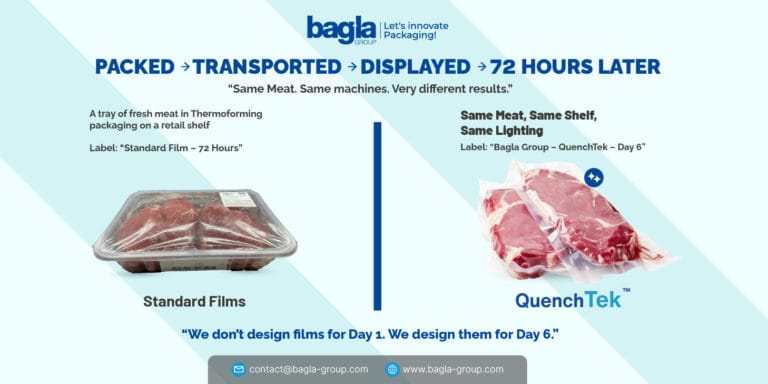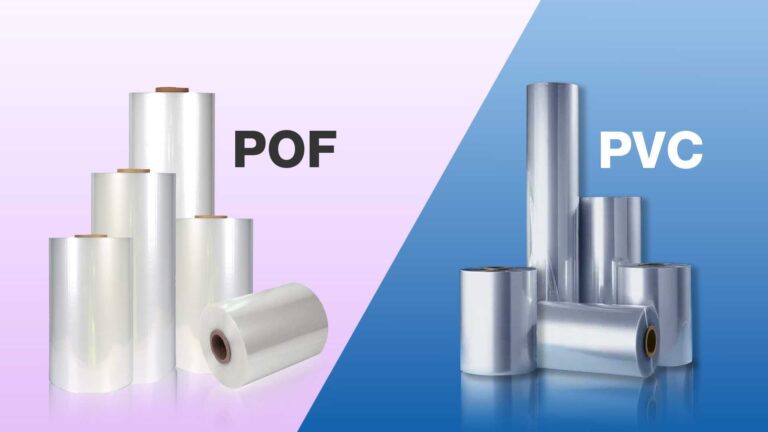The future of food packaging is evolving constantly due to changing customer needs, regulations, and sustainability efforts. Packaging’s expectations and goals have changed from just covering and decorating food to being eco-friendly and running the business efficiently while still meeting their sustainability milestones.
For Bagla Group, sustainability for the future of food packaging means uniting premium packaging materials with an environmentally innovative mindset. This gives food companies the ability to provide consumers with quality products and, at the same time, fulfill environmental corporate social responsibilities.
Why Understanding The “Future Of Food Packaging” Matters Today
Food packaging is everywhere in today’s world, but the food packaging methods of the past will not be effective tomorrow. Understanding what the future of food packaging looks like is essential right now. Here are a few reasons why:
- Environmental Sustainability: The conventional method of food packaging is a notable environmental pollutant, particularly single-use plastic food packaging. It is commonly used, readily available, and only used to serve food. These food packs and wrappers are used to serve and pack food, and are thrown away repeatedly. Biodegradable films, recycled plastic, and compostable materials are examples of packaging and materials that can easily reduce waste and pollution. These innovations also lower the carbon footprint of food packaging.
- Consumer Demand for Sustainability: Nowadays, consumers are more concerned about the value and principles of the businesses from which they plan to purchase products. The first-ever purchase is the first step towards earning the customer’s trust. Customers are more likely to flaunt and endorse the services provided to them, and hence prefer businesses that take up eco-friendly food packaging.
- Compliance with Global & Local Regulations: Governments, regions, and zones worldwide are now beginning to impose rules that regulate the carbon footprint caused by single-use plastics and waste. The European Union, for instance, sets a target for the year 2030 whereby it would ensure that all packaging originating from within the European Union is recyclable or reusable. Countries like India have adopted bans on the theft of certain types of single-use plastics. If businesses neglect the change, they will face penalties, bans, or no access to markets.
- Food safety and shelf life: Modern food packaging is not just about packing it up – modern packaging must focus on preservation of freshness, quality, and safety.
Role Of Premium Packaging In A Sustainable Future
Even though there is a cost concern, advanced packaging materials add value in compliance, brand image, and long-term value for the company.
- Guarding brand image: Advanced materials like high-performance films, adhesives, and tapes ensure the integrity of products from the factory to the shelf, reducing waste by spoilage or damage.
- Convey Quality To Buyers: No simple label or sticker is used to justify cost; premium packaging is used to convey quality in the competitive market and also add to the perception of high quality.
- Sustainability: The use of new proprietary materials, for example, POF shrink films that are now recyclable and biodegradable, will improve packaging performance while reducing the company’s carbon footprint.
Bagla Group’s Commitment To The Future Of Food Packaging
Bagla Group is at the forefront of industry innovation by employing the best in show packaging innovation and delivering Timely solutions to the dynamic marketplace.
Advanced Shrink Films
- Polyolefin (POF) Shrink Films – BPA Free, FDA Compliant, recyclable, intended for direct food contact, and above all else, all of these benefits with less impact than PVC! Overall clarity, high tensile strength, and a lower carbon footprint
- Biodegradable POF Films: POF items such as WrapTek-Bio are designed to degrade faster in natural environments to lessen the amount of long-term waste.
Energy-Friendly Solutions:
WrapTek UltraFresh Low Energy POF Shrink Films require less heat at the processing stage; therefore, total energy consumption is less, carbon footprint is reduced, and the quality of the product is never compromised.
Fully Integrated Manufacturer
Bagla Group is in control of quality every step of their process: Film extruding, printing, slitting, etc. A fully vertically integrated production facility allows them to offer consistency, lower cost, and waste reduction – principles that are logically part of sustained manufacturing.
Innovation Trends Shaping The Future Of Food Packaging
The packaging of food products is changing due to innovation, the need for sustainability, and the change in consumer preferences. The changes are being driven by the following factors.
- Compostable and Biodegradable Packaging: Companies are moving away from plastics and shifting to materials that are easier to recycle. They use partially biodegradable packaging made from polylactic acid, Corn, Seaweed, and Sugarcane, which is Biodegradable and emits far less garbage to the landfills.
- Smart Packaging: includes QR and barcodes, sensors for spoilage, and temperature sensors. It indicates the freshness of the food and is beneficial for food safety, waste minimization, and consumer satisfaction & trust. It makes the entire supply chain and food packaging intelligent.
- Minimalistic and Mono-Material Packaging: It seeks to minimize the complexity of materials used in a product’s packaging to a single base material without layers for easier recycling. A clean, minimalist design also reduces unnecessary ink, glue, and coating.
- Reusable and Refilling Systems: A growing number of companies are offering packaging that can be returned to the company for refilling or reused, instead of continuing single-use packaging that creates waste, contributing to a circular economy.
- Agri-Waste-Based Packaging: Innovators are creating packaging from agricultural waste, such as sugar-cane pulp, orange peels, and wheat husks. It is biodegradable and also credits to a value-added product of an agricultural by-product.
- Plant-Based Packaging and Fiber Packaging: Packaging made from paper and pulp is returning for use in packaging. These materials are renewable, recyclable, and biodegradable—good for dry foods and takeaways.
- Lightweight, High-Barrier Films: New films are lighter than in the past while offering the barrier qualities of older films.
Why Sustainability Is Now A Competitive Advantage
Sustainability is no longer just a moral responsibility, but a competitive advantage. Companies that implement sustainable packaging solutions can benefit from:
- Better brand image
- Improved global standards
- Better efficiencies
- More alignment with customer belief systems.
Bagla Group’s Global Impact
Bagla Group possesses the infrastructure, capabilities, and scale to produce premier sustainable packaging solutions globally, with 8 cutting-edge manufacturing facilities and exports to over 50 countries. Bagla Group has effectively combined engineering excellence with environmentally responsible practices, which is the future of food packaging.
Partnering For A Sustainable Tomorrow
Achieving a sustainable future of food packaging depends on collaboration through the value chain; manufacturers, brands, regulators, and consumers of food packaging all need to be aligned. Bagla Group works with the clients to create a strategy for the packaging advancements that will meet performance specifications today and achieve environmental credentials in the future.
Conclusion
The most successful firms in the food packaging sector will be the ones combining technological advancements with eco-friendly practices. Sustainable high-end packaging, like that offered by Bagla Group packaging innovation company, which is fully recyclable, biodegradable, and energy-efficient, illustrates the fact that packaging can be effective and sustainable simultaneously.
Working together with Bagla Group and other eco-friendly firms allows brands not only to protect the products but also to take care of the earth for future generations while maintaining high-quality innovation.
What Does The “Future Of Food Packaging” Mean For Manufacturers?
It refers to creating packaging that’s safe, high-quality, and sustainable to meet modern market demands.
Are Premium Packaging Materials Compatible With Sustainability Goals?
Absolutely. Our advanced materials, like WrapTek Earth and WrapTek Bio, protect products and the planet at the same time.



